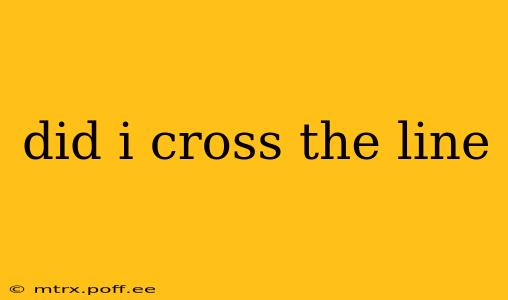Did I Cross the Line? Navigating Ethical Dilemmas and Boundary Violations
Have you ever found yourself questioning your actions, wondering if you've gone too far? The feeling of crossing a line is often accompanied by discomfort, guilt, or uncertainty. This feeling is a valuable internal compass, guiding us towards ethical behavior and healthy relationships. But what constitutes "crossing the line"? It's a complex question with no easy answers, as the boundaries vary greatly depending on context, culture, and individual perspectives. This exploration will delve into various scenarios where we might question our actions and provide guidance for navigating these challenging situations.
What are some common situations where people question if they've crossed a line?
This is a crucial question, and the scenarios are diverse. People may question whether they've crossed a line in professional settings, personal relationships, or even online interactions. Examples include:
- Workplace Conflicts: Did your assertive feedback become aggressive? Did your joke cross the line into harassment or bullying? Did you violate company confidentiality?
- Personal Relationships: Did your playful teasing become hurtful? Did your advice turn into unsolicited criticism? Did you betray a confidence?
- Online Interactions: Did your online comments turn into cyberbullying or harassment? Did you share information without consent? Did you engage in misleading or manipulative behavior?
How can I tell if I've crossed a line in a professional setting?
Navigating professional boundaries is critical for maintaining positive relationships and a productive work environment. Signs you might have crossed a line include:
- Negative feedback or complaints: Colleagues or superiors expressing discomfort or dissatisfaction with your behavior.
- Formal warnings or reprimands: Receiving written or verbal warnings about your conduct from HR or management.
- Changes in relationships: Noticeable distancing or avoidance from colleagues.
- Decreased productivity or morale: A negative impact on your team's overall performance.
- Violation of company policy: Breaking established rules or guidelines.
How do I know if I've crossed a line in a personal relationship?
Personal relationships often involve navigating delicate emotional boundaries. Signs that a line may have been crossed include:
- Changes in communication: A noticeable decrease in communication, increased tension, or avoidance.
- Emotional distress: Your actions causing significant emotional pain or hurt to the other person.
- Broken trust: Betraying a confidence or promise.
- Feeling guilty or remorseful: Experiencing internal conflict or regret about your actions.
- Withdrawal or distancing: The other person withdrawing from the relationship.
What should I do if I think I might have crossed a line?
Recognizing potential boundary violations is the first step towards reconciliation and growth. The appropriate response depends on the situation, but generally includes:
- Honest self-reflection: Carefully consider your actions and their impact on others.
- Sincere apology: If your actions caused harm, offering a genuine apology is crucial. Avoid making excuses or minimizing the situation.
- Open communication: Talk to the person or people affected by your actions. Listen to their perspective and acknowledge their feelings.
- Seek professional help: If the situation is complex or involves significant harm, consider seeking guidance from a therapist or counselor.
- Amend your behavior: Take steps to prevent similar situations from happening again.
How can I prevent crossing lines in the future?
Proactive steps can significantly minimize the chances of crossing boundaries. These include:
- Developing self-awareness: Pay attention to your emotions, impulses, and how your actions affect others.
- Empathy: Consider the perspectives and feelings of those around you.
- Respecting personal space: Maintain appropriate physical and emotional distance.
- Setting clear boundaries: Communicate your limits and expectations clearly and respectfully.
- Seeking feedback: Regularly solicit feedback from trusted sources to gain insight into your behavior.
Crossing a line, whether intentional or unintentional, can have significant consequences. By practicing self-awareness, empathy, and open communication, we can navigate complex situations, strengthen relationships, and cultivate a more ethical and respectful approach to life.
